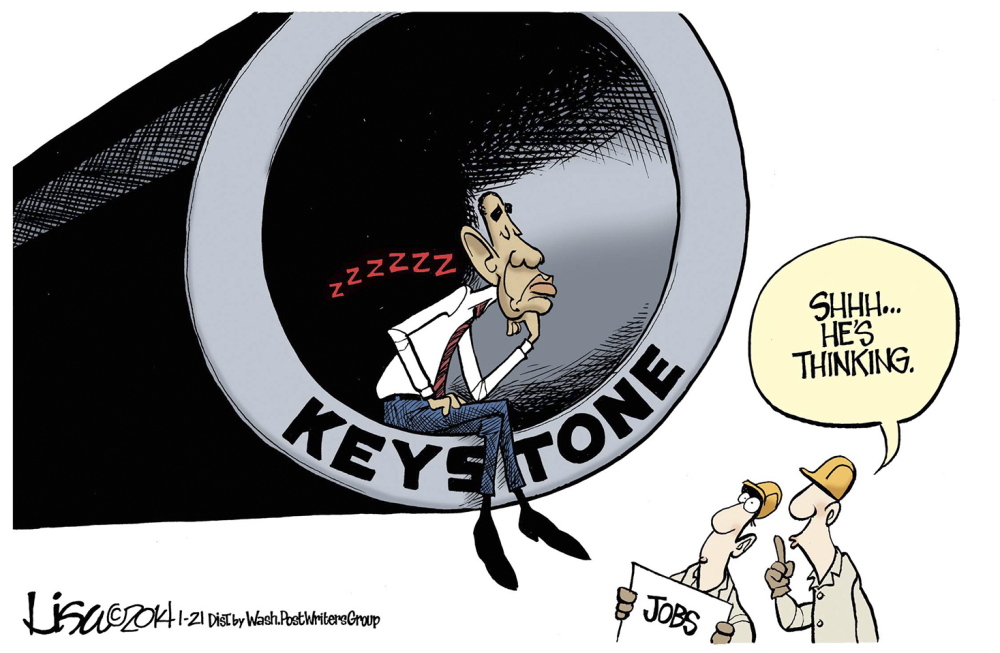The U.S. State Department finally has given the Keystone XL pipeline an unexpectedly green light. In a Jan. 31 report, the agency found the pipeline wouldn’t cause significant environmental damage. It wouldn’t prompt more oil extraction. It wouldn’t increase demand at U.S. refineries. And, surely to the shock of many opponents of the long-proposed pipeline, its construction actually would lead to fewer greenhouse gas emissions than the likely alternatives for moving oil.
The State Department didn’t formally approve the project, but it did give direct answers to the key environmental concerns that President Barack Obama raised when he put a stall on the project last June:
No, the pipeline would not be the environmental horror that the opponents allege.
Yes, it would have a significant economic impact. It would create lots of jobs.
“There are no more excuses for delaying this project,” said Sean McGarvey, president of North America’s Building Trades Unions, which represent 3 million skilled craftsmen. “The time to construct this pipeline is now.”
Yes, now. The Obama administration should promptly approve Keystone XL — and boast about the environmental and economic pluses it will deliver.
To review how we got to the gridlock that has stymied this project:
Keystone XL would link the rich oil sands of inland Canada to U.S. refineries and ports at the Gulf of Mexico. That is, the pipeline would be a safer and more reliable way to move oil from one part of North America to another — oil that now moves primarily by barge, rail and truck.
Yet the Keystone XL project remains in limbo five years after its backers first sought the necessary approval from Washington. There’s speculation that Democratic congressional leaders, for whom the proposal spells trouble no matter how the administration rules, will press Obama to keep a decision on ice until after the November midterm elections. The pipeline plan divides two Democratic constituencies: labor unions that want the job creation, and environmental groups opposed to further development of fossil fuel resources.
These groups see thwarting Keystone XL as a step toward faster development of renewable fuel sources. Trouble is, no matter what Washington decides, Canada will extract this oil and consumers somewhere will use it; the question is whether it goes to U.S. refineries or to markets in China or elsewhere.
Republicans have pushed for approval — House Speaker John Boehner said the president’s stall amounted to “economic malpractice.” But some of the president’s allies have also stepped up the pressure for approval, including Democratic Sens. Heidi Heitkamp of North Dakota and Claire McCaskill of Missouri.
“It’s past time for the president to make a decision — the right decision — and approve this project so we encourage and benefit from energy production from a friend and ally, rather than get those resources from volatile countries elsewhere across the world,” Heitkamp said in response to the State Department report.
Canadian Prime Minister Stephen Harper has been pressing for years for U.S. approval of the $5.4 billion pipeline. With the project, Canadian energy resources can be put to use more efficiently. Without it, Canada will work around the U.S., expanding its access to ports on its Atlantic and Pacific coasts. More oil will be transported by methods that carry a higher risk of accidents — witness the carnage last summer when a train loaded with oil exploded in the Canadian city of Lac-Megantic, killing 47 people.
What’s most striking in the State Department report appears deep in the fourth of its 11 volumes, under the heading Greenhouse Gas Impacts. Three scenarios if the pipeline isn’t built:
⢠If the oil instead moves to refineries by rail and tanker, greenhouse gas emissions would be 27.8 percent higher.
⢠If the oil is transported by train to existing pipelines, emissions would be 39.7 percent higher.
⢠And if the oil goes to the Gulf solely by train, emissions would be 41.8 percent higher.
The obvious conclusion: The Obama administration should strike a blow for environmentalism and approve the Keystone XL project.
The White House has said it will wait at least until other federal agencies have a chance to comment on the State Department report. That could delay a final decision for 90 days — or 190, or longer.
Enough. Get to work — and put people to work — on the Keystone XL pipeline.
Editorial by the Chicago Tribune
Send questions/comments to the editors.



Success. Please wait for the page to reload. If the page does not reload within 5 seconds, please refresh the page.
Enter your email and password to access comments.
Hi, to comment on stories you must . This profile is in addition to your subscription and website login.
Already have a commenting profile? .
Invalid username/password.
Please check your email to confirm and complete your registration.
Only subscribers are eligible to post comments. Please subscribe or login first for digital access. Here’s why.
Use the form below to reset your password. When you've submitted your account email, we will send an email with a reset code.